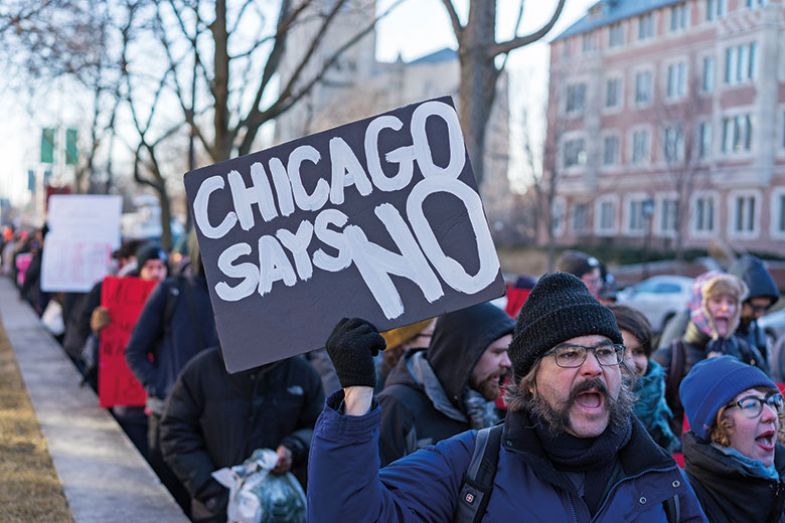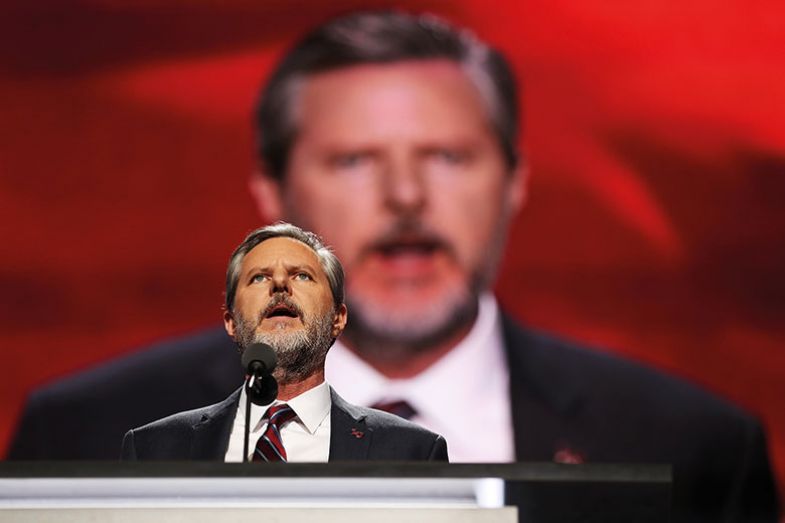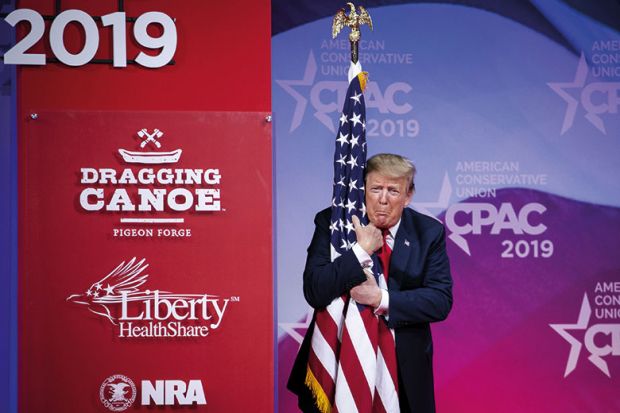Donald Trump’s bombastic threat to cut federal research funding from US universities that somehow fail to protect free speech is largely being taken as partisan theatre with little political or legal rationale.
Even Mr Trump’s own conservative allies have admitted confusion over or opposition to the suggestion, which consisted of a five-sentence reference during a record two-hour performance at a fiercely partisan rally.
In it, the president said simply that he would “be very soon signing an executive order requiring colleges and universities to support free speech if they want federal research dollars”.
Because of the money involved – the federal government spends some $35 billion (£27 billion) a year on university-based research – academic institutions took the comment seriously.
A leader in campus efforts to protect free speech rights, Robert Zimmer, the president of the University of Chicago – which itself attracts about $1 billion a year in federal research dollars – issued a warning that an executive order imposing government-defined parameters of open expression could easily backfire.
“It would be a grave error for the short and the long run,” said Professor Zimmer, whose 2015 “Chicago principles” on tolerance of objectionable commentary on campus have enjoyed bipartisan support and been adopted by dozens of other US campuses.
The major lobby association for higher education, the American Council on Education, warned that Mr Trump could end up forcing his allies among religious colleges to accept speakers fiercely opposed to their agendas.

Concerned conservatives
But in the week since Mr Trump’s address to the annual Conservative Political Action Conference, the White House has provided no further explanation, and many of his traditional conservative defenders have remained quiet.
Some are even admitting concern. Richard Vedder, an emeritus professor of economics at Ohio University and a prominent voice of academic conservatism, said that he was among those fearing “that the problem could be aggravated, not relieved, by the proposed solution”.
Instead of seeking more government control over higher education, Professor Vedder says in a Forbes commentary, he would prefer to see conservatives finance on-campus programmes that present alternative viewpoints.
A former Trump policymaker in the Department of Education, Adam Kissel, also expressed uncertainty over the idea – and said that some current administration officials shared his reservations.
Writing in the conservative National Review, Mr Kissel, a former deputy assistant secretary for higher education programmes, raises a series of potential pitfalls in defining and enforcing such an order.
“Not even all the current senior agency appointees are on board,” says Mr Kissel, now a visiting scholar at American University and director of civic and higher education programmes at the Philanthropy Roundtable.
As such, the Trump free speech proposal appears to fit his policy formulation pathway of identifying an issue of emotional fervour for his ideological base of supporters, justifying it with examples of dubious relevance, and theatrically advancing rudimentary or impractical responses with little regard to real-world viability.
The fervour stems from a long-standing and growing conservative grievance with higher education, often attributed to a sense among poorer Americans that university is an experience that somehow leaves them behind. It is an alienation frequently fostered by political leaders who themselves attended top US colleges or send their children to them.
Among them is Mr Trump himself, a graduate of the Ivy League’s University of Pennsylvania, who on the campaign trail repeatedly described himself as one who “loves the poorly educated”.
As an example of the need for an executive order, Mr Trump cited an incident last month in which an activist recruiting for conservative causes on the campus of the University of California, Berkeley was punched in the face by a former Berkeley student.
Mr Trump brought the victim, Hayden Williams, on stage at the conference just outside Washington in the lead-up to his announcement of the free speech order.
“If they want our dollars, and we give it to them by the billions,” Mr Trump said of US universities, “they’ve got to allow people like Hayden and many other great young people, and old people, to speak.”
US college leaders protested, however, that Berkeley actually had allowed Mr Williams on its campus to set up a recruitment table on behalf of Turning Point USA, a group that publicises the names of professors whom it accuses of discriminating against conservative students and beliefs.
Berkeley administrators themselves have also condemned the assault and have banned the suspect arrested in the case, Zachary Greenberg, from returning to campus.
“It’s not clear what the president thinks Berkeley should have done differently,” said Terry Hartle, the senior vice-president for government and public affairs at the American Council on Education.
Turning Point USA is the same group to which Mr Trump last year insisted that any problems of free speech on college campuses were heavily exaggerated. “I think it’s highly overblown. Highly overblown,” the president said at the time.
Dr Hartle predicted that if Mr Trump now follows through on his promise of an executive order to address that issue, the repercussions would be worse than any benefits – including for his own partisans.
Examples, Dr Hartle said, could include Yeshiva University being forced to host a talk by a Holocaust denier or Liberty University, a firm political ally of Mr Trump, being required to host an atheist’s appearance.
Those institutions, however, receive relatively little in federal research money – with about $3 million a year, Yeshiva is ranked 452nd nationally on such funding, while Liberty gets less than $1 million and is ranked 672nd.
A more substantive concern, Dr Hartle said, would be the creation of scenarios in which police try to close a controversial event for safety reasons and university administrators are forced to choose between rejecting their advice or risking their research enterprise.
“Such an executive order”, he said, “could easily weaponise the free speech issue, by creating incentives for people to create disruptive events.”
In the days since Mr Trump’s speech, administration officials have declined to provide any more details on what he plans. Inside Higher Ed reported that the president might issue the order in days, along with others concerning student loan policy and data on student outcomes.
Executive orders are presidential mandates with the force of law unless contradicted by Congress or the courts. While many such orders are ceremonial, some have significant policy effects. As a presidential candidate, Mr Trump regularly criticised Barack Obama for his use of them in the face of an opposition-led Congress. With a Republican-led Congress in his first two years, however, Mr Trump issued them at a 50-year high.
Professor Zimmer, in his statement to the Chicago community, said he does not believe that either executive or legislative action is needed to address free speech concerns.
The Chicago principles, now adopted by at least 45 US colleges and universities, state that “concerns about civility and mutual respect can never be used as a justification for closing off discussion of ideas, however offensive or disagreeable those ideas may be to some members of our community”.
The principles do allow narrow exceptions for violations of law, including genuine threats or harassment, and to allow an institution to maintain a reasonable daily schedule.

Liberty's limits
One of the most aggressive advocates for their adoption is the Foundation for Individual Rights in Education, or Fire, a conservative-founded group that finds fault in free speech commitments on both sides of the political aisle.
Fire took particular issue with Liberty University and its president Jerry Falwell Jr, a staunch Trump ally, for praising Mr Trump’s promise of a free speech executive order and then claiming that Liberty allows open political expression on its campus.
Fire this year ranked Liberty among its 10 worst US campuses for allowing free speech, citing such problems as limits on student choices of campus speakers and administration censorship of the student newspaper.
Mr Falwell’s promises of a free and open intellectual environment “remain empty”, Fire said.
The organisation is among those that have withheld comment on Mr Trump’s promised executive order on free speech, saying that it first wanted to see the details.
POSTSCRIPT:
Print headline: Few voices raised to support Trump's free speech threat
Register to continue
Why register?
- Registration is free and only takes a moment
- Once registered, you can read 3 articles a month
- Sign up for our newsletter
Subscribe
Or subscribe for unlimited access to:
- Unlimited access to news, views, insights & reviews
- Digital editions
- Digital access to THE’s university and college rankings analysis
Already registered or a current subscriber? Login








